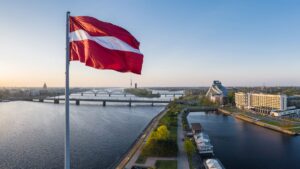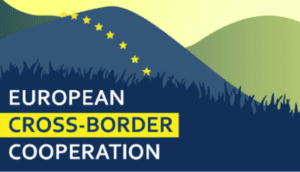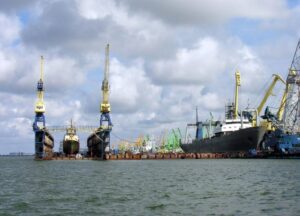
The overwhelming majority of Ukrainians have a positive attitude towards Latvia, which indicates a consistently high level of sympathy for this country. These are the results of a sociological survey conducted by Active Group in collaboration with the Experts Club analytical center.
According to the results, 72.7% of respondents rated Latvia positively (41.0% — completely positive, 31.7% — mostly positive). A neutral attitude was expressed by 21.3% of respondents, while only 5.3% declared a negative position (2.3% — completely negative, 3.0% — mostly negative). Only 0.7% of respondents said they had no information about this country.
“The survey results show an extremely high level of trust and sympathy among Ukrainians towards Latvia. This country is perceived not only as a political ally, but also as a partner that consistently supports Ukraine in the international arena,” said Alexander Pozniy, head of Active Group.

In turn, Maksim Urakin, co-founder of Experts Club, drew attention to the economic indicators of bilateral trade.
“According to the results of the first six months of 2025, trade turnover between Ukraine and Latvia reached $263.9 million. Ukrainian exports amounted to $154.2 million, while imports amounted to $109.7 million.
The positive balance amounted to more than $44.5 million, which favorably distinguishes Latvia among Ukraine’s other trading partners in the EU,” the expert emphasized.
Thus, Ukraine and Latvia not only maintain a high level of mutual sympathy, but also demonstrate balanced and mutually beneficial trade and economic cooperation.
The full video can be viewed at: https://www.youtube.com/watch?v=YgC9TPnMoMI&t
You can subscribe to the Experts Club YouTube channel here: https://www.youtube.com/@ExpertsClub
ACTIVE GROUP, BALTIC STATES, EXPERTS CLUB, LATVIA, Pozniy, SOCIOLOGY, TRADE, UKRAINE, УРАКИН

Ukrainian tour operator Join UP! plans to launch franchising in the Baltic States and Kazakhstan in 2024, according to Marina Dayneko, head of the Join UP! sales office, in an interview with the Interfax-Ukraine news agency.
“Currently, more than 100 agencies are operating under this model in Ukraine, and four in Moldova, two of which opened this year. We are continuing to develop franchising in Poland and are currently signing agreements with both Polish and Ukrainian partners. This year, we are launching franchising in Kazakhstan and the Baltic states,” she said.
As reported, the travel company Join UP! LLC was established in 2013 with a registered capital of UAH 72.671 million. The ultimate beneficiaries are Yuriy and Oleksandr Alby. According to the OpenDataBot service, at the end of 2024, the tour operator’s revenue decreased to UAH 376,000 from UAH 16,639,000 in 2023, and its net loss decreased to UAH 217,451,000 from UAH 233,341,000, respectively.
The brand’s international expansion covers eight markets: the Baltic states, Kazakhstan, Moldova, Poland, Romania, and the Czech Republic. Preparations are underway to launch operations in Slovakia and Hungary. Last year, the brand also opened its first franchise agency on the international market in Katowice, Poland.

The Ministers of Internal Affairs of the Baltic States and Poland visited Ukraine, where they signed a multilateral agreement on cooperation in preventing cross-border crime and restoring the sphere of activity of the Interior Ministry of Ukraine after the end of hostilities.
Estonian Interior Minister Kristian Jaani said that his country will continue to fully support Ukraine, the press service of the Estonian Interior Ministry said on Friday. This applies to both direct political and practical support for Ukraine, including humanitarian support, as well as post-war reconstruction, the imposition of tough sanctions against Russia, Jaani said.
He said that Estonia would fully support granting Ukraine the status of a candidate country for membership in the European Union.
The minister noted that the total contribution of Estonian humanitarian aid is more than EUR16 million, including support for civil society and the private sector.
Marine rescue and sapper suits, folding beds, tents, generators, VoIP phones and much more have been sent to Ukraine through the Interior Ministry of Ukraine.
“At 48 hours’ notice, we are ready to send sappers,” Jaani said.

The profile ministries of Ukraine and Lithuania have agreed to launch a pilot project to develop multimodal transportation between the countries, according to the website of the Ministry of Infrastructure of Ukraine on Thursday.
In Klaipeda, Lithuania, a meeting was held between Minister of Infrastructure of Ukraine Oleksandr Kubrakov and Minister of Transport and Communications of Lithuania Marius Skuodis, during which the parties discussed issues of strengthening cooperation and prospects for new projects.
“Partnership in the field of transport is one of the priorities. We are restoring a dialogue on the implementation of an old idea – connecting the Baltic and Black Sea regions by rail. For both countries this is a chance to optimize logistics, increase the load on seaports and enter new world markets. We have already agreed to launch a pilot project, within the framework of which we will develop multimodal traffic between countries, including by increasing the flow of semi-trailers,” Kubrakov is quoted as saying.
He also noted the relevance of the resumption of the passenger railway route “four capitals” from Kyiv to Riga.
According to the Ministry of Infrastructure, there are currently large cargo flows between the Baltic and Black Sea regions, but the share of cargo moving from Ukraine is very low. At Klaipeda seaport, Ukrainian cargo accounts for only about 1-2% of all cargo. At the same time, according to the estimates of the Lithuanian side, the flow of goods from Ukraine could potentially be 10 times higher.
“For the implementation of multimodal cargo transportation by sea and rail, road semi-trailers will also be used as intermodal transport units. To make this possible, the ministry will initiate amendments to Ukrainian legislation, which will allow semi-trailers to be classified as cargo, and not as a vehicle,” the report said.
The launch of the pilot project is planned for September this year.
The successful implementation of the agreement, as noted in the Ministry of Infrastructure, has the potential to make Klaipeda seaport in Lithuania the northern gateway of Ukraine to Scandinavia and at the same time Odesa – the southern sea gate of Lithuania to the Black Sea region.
BALTIC STATES, BLACK SEA, DEVELOPMENT, LITHUANIA, TRANSPORTATION